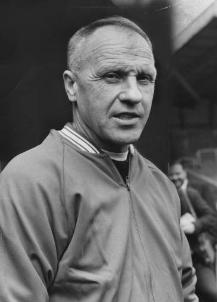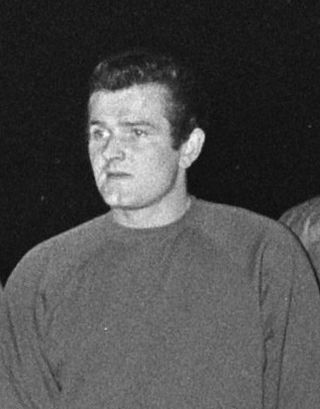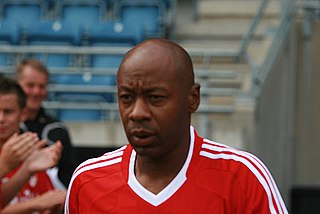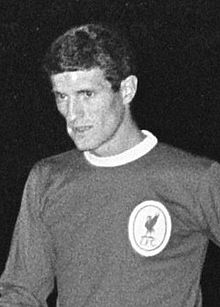
William Shankly was a Scottish football player and manager who is best known for his time as manager of Liverpool. Shankly brought success to Liverpool, gaining promotion to the First Division and winning three League Championships and the UEFA Cup. He laid foundations on which his successors Bob Paisley and Joe Fagan were able to build by winning seven league titles and four European Cups in the ten seasons after Shankly retired in 1974. A charismatic, iconic figure at the club, his oratory stirred the emotions of the fanbase. In 2019, 60 years after Shankly arrived at Liverpool, Tony Evans of The Independent wrote, "Shankly created the idea of Liverpool, transforming the football club by emphasising the importance of the Kop and making supporters feel like participants".

John "Ian" St John was a Scottish professional football player, coach and broadcaster. St John played as a forward for Liverpool throughout most of the 1960s. Signed by Bill Shankly in 1961, St John was a key member of the Liverpool team that emerged from the second tier of English football to win two league titles and one FA Cup—in which he scored the winner in the 1965 final—to cement a position as one of the country's top sides. He played for Scotland 21 times, scoring nine goals.
Brian Hall was a Scottish footballer who played as a midfielder. He won six domestic and UEFA trophies with Liverpool in the 1970s. He then played for Plymouth Argyle and Burnley.
Alec Lindsay is an English former footballer who played in the Football League for Bury, Liverpool and Stoke City.

Chris Lawler is a former footballer who enjoyed much of Liverpool's success of the mid 1960s to early 1970s.
Peter Barr Cormack is a Scottish former international football player and manager. His greatest success was with Liverpool in the early 1970s, for whom he played 178 times, winning two league championships, one FA Cup and two UEFA Cup medals.

Ronald Yeats is a Scottish former association footballer. He was a key defender in the rejuvenation of Dundee United in the early 1960s. He then spent a decade at Liverpool captaining them to six trophies in the mid-1960s. He later had three years as player/manager at Tranmere Rovers. Yeats was also player/manager at Barrow and Santa Barbara Condors. He also made appearances for the Scotland national team.

Thomas Johnstone Lawrence was a Scottish professional footballer who played as a goalkeeper for Liverpool and Tranmere Rovers from the 1950s to the 1970s. Lawrence was with Liverpool for 14 years, making more than 300 league appearances, and he played in three full internationals for Scotland during the 1960s.

Mark Everton Walters is an English former professional footballer who made 600 league appearances between 1981 and 2002.
Alan A'Court was an English professional footballer who mostly played for Liverpool. He gained five caps for England and represented the nation at the 1958 FIFA World Cup.
The 1975–76 season was the 96th season of competitive football in England.

William McClure Johnston is a Scottish former professional footballer. He played over 600 games in a 20 year senior playing career. His 5 Rangers major trophy wins included him scoring 2 goals when winning the 1972 European Cup Winners' Cup final. Johnston also played for Hakoah Sydney, West Bromwich Albion, Vancouver Whitecaps, Birmingham City, Heart of Midlothian, South China AA and East Fife. With the Whitecaps he was part of the Soccer Bowl '79 winning team. His 22 full Scotland caps included against Peru at the 1978 FIFA World Cup. He was sent home from the competition early after subsequently testing positive for Reactivan in that game.
Bobby Graham is a Scottish retired professional footballer who played for Liverpool during the 1960s.
William Fagan was a Scottish footballer, who played for Celtic, Preston North End and Liverpool.

The 1965 FA Cup final was an association football match between Liverpool and Leeds United on 1 May 1965 at Wembley Stadium, London. It was the final match of the 1964–65 FA Cup, the 93rd season of England's primary cup competition, the Football Association Challenge Cup, better known as the FA Cup. Liverpool were appearing in their third final, they had lost the previous two in 1914 and 1950, while Leeds were appearing in their first.

Thomas Smith was an English footballer, who played as a defender at Liverpool for 16 years from 1962 to 1978. Known for his uncompromising defensive style, manager Bill Shankly once said of him: "Tommy Smith wasn't born, he was quarried". A central defender for most of his career, Smith's most memorable moment for the club probably came when he scored Liverpool's second goal in the 1977 European Cup Final against Borussia Mönchengladbach. Smith played once for England in 1971, and also played at club level for Tampa Bay Rowdies, Los Angeles Aztecs and Swansea City.
John Purcell Nicholson was an English footballer. A "big, solid" centre-half, he played 254 league and cup games in a nine-year career in the Football League before his death at the age of 29.
The 1964–65 season was Liverpool Football Club's 73rd season in existence and their third consecutive season in the First Division. The club won its first FA Cup thanks to a 2–1 extra time victory against Leeds United in the final. The club's first final for 15 years saved a season in which Liverpool slipped from first to seventh in the league, and controversially collapsed at the hands of Inter in the European Cup semi-finals, in the club's first season in European competition.

The history of Liverpool Football Club from 1959 to 1985 covers the period from the appointment of Bill Shankly as manager of the then-Second Division club, to the Heysel Stadium disaster and its aftermath.
Ben Seddon is a footballer who played as a central defender in the Football League for Tranmere Rovers.










